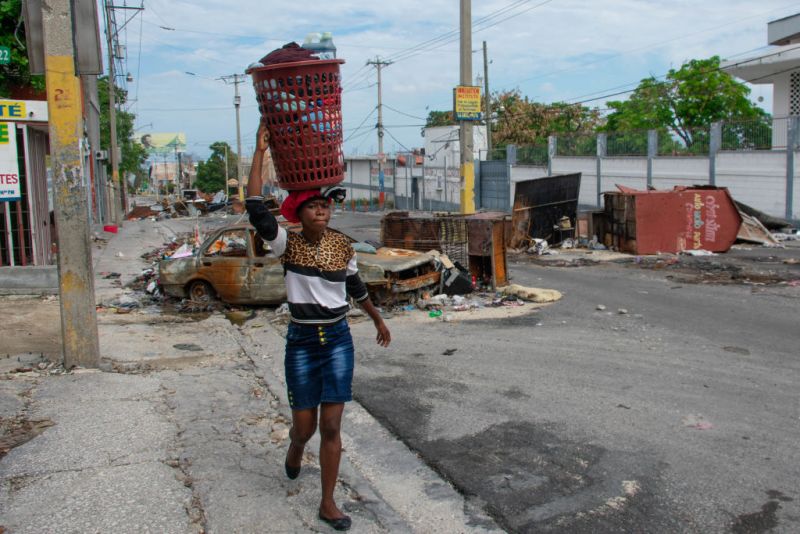Haiti in danger of ‘a real genocide,’ priest warns

 People flee their neighborhoods on May 2, 2024, after armed gangs terrorized the Delmas 24 and Solino areas on the night of May 1 in Port-au-Prince, Haiti. / Credit: CLARENS SIFFROY/AFP via Getty Images
People flee their neighborhoods on May 2, 2024, after armed gangs terrorized the Delmas 24 and Solino areas on the night of May 1 in Port-au-Prince, Haiti. / Credit: CLARENS SIFFROY/AFP via Getty Images ACI Prensa Staff, May 9, 2024 / 18:25 pm (CNA).
The tragedy that Haiti is experiencing has reached a point where “it runs the risk of provoking a true genocide in the country,” warned Father Henry Marc Siméon, director of the communications office of the Archdiocese of Port-au-Prince, the country’s capital.
In an interview with ACI Prensa, CNA’s Spanish-language news partner, Siméon pleaded for support: “The people [of Haiti] who are crying out for help today need men and women of goodwill from all countries to come to their aid to help us, to get out of this situation we’re living in.”
The priest noted that Pope Francis has made repeated calls for peace and in support of the people of Haiti. Just on April 28, on the occasion of the recitation of the Regina Caeli when he was in Venice, the Holy Father prayed “that the God of peace illuminate hearts so that the will for dialogue and reconciliation may grow in everyone.”
Siméon shared the drama they are experiencing daily: “Some say that today Port-au-Prince has become an open-air cemetery. You walk down the street amid corpses. There is not a day when, if we walk through the center of the city, we don’t come across corpses of people whose identity and origin we don’t know, and whose families sometimes cannot give them a decent burial.”
The Haiti crisis
Haiti, according to the World Bank, is the poorest country in Latin America and the Caribbean region. In the nation of 11.5 million people, there are major socioeconomic and political challenges, including extreme poverty, political instability, and violence.
The country has faced multiple humanitarian crises from which it has not been able to recover. In 2010 the country was shaken by a 7.1-magnitude earthquake. Eleven years later, without being able to overcome the damage from the previous tragedy, a new earthquake, this time measuring 7.2, occurred in the country on Aug. 14, 2021. A few days later Tropical Storm Grace brought even more destruction to Haiti.
Along with the natural disasters, violence in the country has become increasingly rampant. In July 2021, the then-president of Haiti, Jovenel Moïse, was assassinated by a group of armed men.
Political tensions due to disputes over elections and anti-government protests have continued ever since, despite the efforts of the international community. On April 25 of this year Prime Minister Ariel Henry, who was serving as the country’s interim leader, resigned, and Michel Patrick Boisvert took over, also on an interim basis.
According to the United Nations, “almost 5 million Haitians are going hungry and need food assistance, according to recent U.N. figures, but the violence and related insecurity created by heavily armed rival gangs operating mainly in the capital are posing more questions about how to make sure those beleaguered people get enough to eat, now and in the future.”
Gangs force people to pay ‘tolls’
The same U.N. report states that almost 90% of the metropolitan area of Port-au-Prince is controlled by gangs. The priest further lamented that “we cannot leave … to go to another district of the country without going through a point controlled by the bandits. We have to pay tolls.”
Siméon recalled a recent call from a nun who told him that “they stopped her car with nuns and laypeople aboard. They charged them the toll to proceed and kidnapped a person who came with them.”
Although “some religious congregations [continue] to operate” in the country, he said, “there are many difficulties for religious communities to function and continue their mission.”
“On several occasions, gang members have kidnapped religious men and women,” he noted, including six nuns of the Sisters of Sainte-Anne, six Brothers of the Sacred Heart, and three Sisters of St. Joseph of Cluny. All the sisters and four of the brothers were later released.
The Church and efforts to ‘stop the violence’
The director of the communications office of the Archdiocese of Port-au-Prince highlighted the work that the Catholic Church is doing with young people in an effort to change the future of the country.
Many of the young people, he said, “understand what is happening and understand the need to work together to stop the violence.”
“There are many initiatives through which we support young people and help them understand the reality of violence, security, and the impact that this violence has on the country and on their own lives and future,” he said.
This story was first published by ACI Prensa, CNA’s Spanish-language news partner. It has been translated and adapted by CNA.




